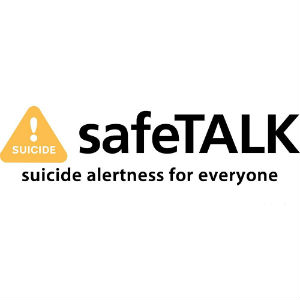By Crystal Abbe Graham

Most national organizations would say yes, but would also point out, that if there is immediate danger, you should never put yourself in harm’s way.
As a certified trainer in suicide prevention and former state director of a national suicide-prevention non-profit, my training would say that even in cases where the person is alone, there are things that you might have been able to do to help save that person’s life – maybe not during the actual moment of crisis – but in advance. In most cases, there are warning signs that should alert you that the person may be thinking of suicide. If you recognize those warning signs, you may be able to prevent suicide.
Warning signs of suicide
Listen to key words. Do you hear your friend talking about being a burden to their loved ones or having no reason to live?
Lack of self care. Has your loved one changed their behavior in some way? Are they acting out of character or increasing their alcohol or drug use? Are they not sleeping or sleeping too much or having mood swings?
Giving away personal items. If someone is giving away items that are important to them, this could be a sign that they have made a decision to end their life and are trying to tie up loose ends. Trust your instincts, and don’t be afraid to ask questions.
Ways you can help prevent suicide
Ask a person directly about suicide. Having a conversation about suicide takes away some of the stigma that is generally associated with it. Show the person that you care and are open to a conversation about mental health and depression. If someone has cancer or a heart condition, they are generally not afraid to talk to friends or co-workers about the health issue, right? If someone struggles with a mental-health condition, they should feel the same sense of freedom to discuss the condition. There’s no reason to whisper about it as if the condition is somehow your fault. It’s healthy to have open conversations about depression and thoughts of suicide.
Make time to listen. If you are worried about someone, giving your time to listen can go a long way. Many people with suicidal ideations feel alone and ashamed. Having someone who will listen to their problems without trying to solve their issues or judge them can go a long way. It often helps just to know they have someone that cares and that they can share their problems with. And no matter how small the issue may seem to you, remember that this is a big deal to them. Listen without judgement or advice. Be sure to give cues that you are listening by nodding your head or just saying, I’m listening.
Encourage them to get mental health care. Having a professional to listen and guide them can go a long way to saving their life. There is no reason to be ashamed to get mental health treatment. Just like your physical health, many people struggle when it comes to a condition in the brain. Encourage your friend to take the first steps to talk to a mental health professional. People find many different ways to cope including medication, healthy lifestyle changes including exercise and good sleep, talk therapy and more.
Have a plan. If you are concerned about someone and have had conversations about thoughts of suicide, it might be helpful to ask them if they have someone close to them that they trust who can be there for them in crisis. This needs to be someone willing to be ASIST trained to lead an intervention if necessary.
Take a suicide-alert training course. There are numerous suicide-prevention trainings available throughout the world including safeTALK and ASIST. In safeTALK, you are taught to be a suicide-alert helper and to recognize someone who may be in danger and connect that person with a caregiver who can complete a suicide intervention. ASIST is a two-day program that teaches you the intervention side to help someone in crisis.
Upcoming trainings
Mental Health America Augusta will be offering two safeTALK trainings in March 2020. For more information on those trainings, visit https://www.facebook.com/pg/MentalHealthAmericaOfAugusta/events/
Conclusion
It’s true that in a moment of crisis, if the person is alone and doesn’t reach out, there may be little you can do at that point. However, it’s very possible that the person will put out signs that they are thinking of suicide before they reach the crisis point. Being alert, asking questions and taking time to listen shows not only that you care, but that they have someone they can trust. In many cases, you can show continued support by encouraging a long-term plan including mental-health counseling and removing access to means from their home. A little training goes a long way in your role in suicide prevention.
If you are worried about someone or having thoughts of suicide, please call the National Suicide Prevention Lifeline at (800) 273-TALK.
Crystal Abbe Graham is a suicide prevention advocate with more than a decade of experience volunteering and working in mental health. She was instrumental in leading a support group for survivors of suicide loss and a former state director for a national suicide prevention nonprofit. Her identical twin sister, Christina, died by suicide at age 15. For helpful links and information related to suicide prevention, visit The Ditto Project at www.thedittoproject.org










